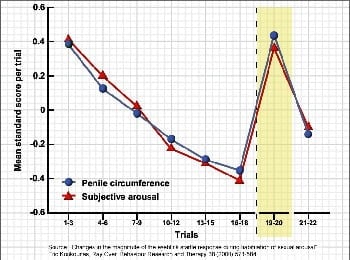Answer: Dopamine and other neurochemicals.
Sexual variety. Said one forum member:
I am engaged, and I want to be in love with my future wife. However, when I see an attractive girl, I just want to fuck (sorry for the word) her, and then when I see another, I want to fuck her, too. In 2004, I saw European porn with amazingly naturally beautiful girls. Since, then I have always wanted to taste some of those girls. And as I watched more porn, I sought more such European porn. So I wanna go out there, and fuck a few such girls to see how it feels. Also, because I have been watching porn for such a long time, I have become very selective, and I want only particular type of body, particular type vagina etc.
I feel like a part of my mind is rebelling because of these desires will remain unfulfilled in a monogamous relationship. My fiancee is a gem of girl, and I would be the world’s biggest moron to lose her. Please help me understand this oversensitivity to other girls that I am feeling, this desire that I have to jump from one girl to another (just as I used to switch porn vids from one to another).
Extreme stimulation, such as today’s Internet porn with its constant novelty and variety (see: Porn, Novelty, and the Coolidge effect), can interfere with the ability to sustain a contented pair bond (that is, to remain committed and satisfied with one partner).
Humans are pair bonders. That is, we are wired, on average, to fall in love and stay together…at least long enough so that we both fall in love with any offspring. That way, our infants have two committed caregivers, which improves their odds of survival because humans take so long to mature.
However, the brain circuitry that pushes us toward these unions is the same circuitry that is hijacked by very stimulating activities and behaviors. So, for examples, drugs, alcohol, gambling, and Internet porn hijack the brain circuitry that is there to give us rewarding feelings for pairing up and sexing one another. Internet porn is especially enticing, because the chance to have sex with a novel partner automatically releases extra dopamine – and causes us to ejaculate more semen more quickly. (No mammals are perfectly monogamous…even pair bonders. Mother Nature wants us tempted by prime opportunities for passing on more genes—but normally such opportunities would be rare, and involve real partners. However we still respond to sexual variety.)
For example, when Australian researchers (graph) displayed the same erotic film repeatedly, test subjects’ penises and subjective reports both revealed a progressive decrease in sexual arousal. The “same old same old” just gets boring. Habituation indicates declining dopamine. After 18 viewings—just as the test subjects were nodding off—researchers introduced novel erotica for the 19th and 20th viewings. Bingo! The subjects and their penises sprang to attention. (Yes, women showed similar effects.)
Internet porn is especially enticing to the reward circuitry because novelty is always just a click away. It could be a novel “mate,” unusual scene, strange sexual act, or—you fill in the blank. With multiple tabs open and clicking for hours, you can experience more novel sex partners every ten minutes than our hunter-gatherer ancestors experienced in a lifetime.
Internet porn offers a steady stream of novel “partners” of every shape, size and culture. And an old part of our brain perceives them all as genetic opportunities. Result? Each new “opportunity” releases a big, motivating surge of dopamine to urge us to fertilize her and find the next one (The Coolidge Effect). This concept is explained in the Your Brain On Porn video.
This is the way enticing activities and substances hijack our mating/bonding circuitry. It’s through triggering the production of abnormal amounts of dopamine and other neurochemicals. If the alternative activities produce more dopamine than falling in love and pairing up – our priorities can subtly change without our conscious awareness. And our priorities will remain distorted until our brain returns to normal sensitivity, which may take a couple of months without intense stimulation.
Meanwhile, although we may like the idea of a committed union, we may be haunted by the enticing dopamine surges produced by thoughts of sex with a novel partners, sexual variety. While our brain is returning to its normal balance, the thought of staying with one partner may cause inner conflict and resentment.
In short, too much dopamine can impede the workings of our brain’s natural pair bonding mechanism. We know this because recent research on monogamous animals made it clear. When scientists artificially flooded the pair bonders’ brains with chemical stimulation that jacked up dopamine, these naturally monogamous animals no longer formed a preference for one partner. The artificial stimulation had hijacked their dopamine-dependent bonding machinery, leaving them just like regular (promiscuous) mammals.
In short, the same sensitivity that urges us to fall in love becomes a vulnerability when we’re saturated with hyperstimulating sexual goodies. Suddenly, the circuitry on which our pair bond depends is inundated with dopamine associated with stimuli other than our mate. It can make a mate uninteresting, and override our normal satiation mechanisms.
Time without the intense stimulation of Internet porn (or porn fantasy) is the best cure. Daily affection helps too, by supplying the subconscious signal to bond.
![]() Also see the advice of the man below, which was given to the man quoted above.
Also see the advice of the man below, which was given to the man quoted above.